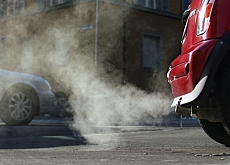
Parliament votes in favour of eco-cars

After a marathon debate on Swiss climate and energy policies, parliament has called for better energy efficiency, in particular via the use of eco-friendly cars.
During Wednesday’s five-hour-long session, which opened with sharp exchanges between left- and rightwing parties, 40 speakers in the House of Representatives presented over 70 different proposals.
Environment Minister Moritz Leuenberger, who outlined the government’s new energy policy, said “far-reaching measures” were needed to combat global warming and to prevent a power shortfall in Switzerland after 2020.
Despite numerous differences, especially over nuclear power, all parties recognised the need to encourage energy efficiency and the promotion of renewable energies.
“The potential for savings in household appliances, buildings and cars is enormous,” said Christian Democrat parliamentarian Ruedi Lustenberger.
Proposals in favour of a variable tax according to a vehicle’s environmental impact and energy consumption were passed. The House also voted to reduce CO2 emissions in new vehicles sold in Switzerland, in line with levels in the European Union.
Brussels currently obliges manufacturers to lower emissions to 130 grams per kilometre from 2012, while in Switzerland the limit is 189 grams per kilometre.
Parliamentarians also called on the government to more actively promote energy-saving standards in buildings and to reduce the consumption of non-renewable energy during building and renovation work.
CO2 tax
On Tuesday, the House agreed on the final details of a CO2 law, paving the way for a tax on carbon dioxide emissions.
The legislation, likely to come into force next year, foresees the staggered introduction of a levy on heating oil. It also allows the government to tighten regulations on gas power utilities.
However, there is no carbon tax on petrol and diesel in Switzerland as long as a voluntary measure – known as “climate centime” – is sufficient to cut CO2 emissions in line with the Kyoto Protocol.
Switzerland has pledged a ten per cent reduction in CO2 levels by 2010.
Environment Minister Moritz Leuenberger said he was relieved by the decision.
“It took a long time and needed many comprises, but for first time we new have a tax. We can now introduce the CO2 tax and together with the climate centime we are on target for meeting the Kyoto agreements,” he told public radio.
He said it was only a first step but a very important one.
“Further measures will have to follow, including boosting energy efficiency and the use of renewable energy,” he added.
Green energy
During the three-week spring session, parliament has approved plans to reduce the tax on eco-friendly fuels, including biogas, bioethanol and biodiesel. Both chambers also agreed on measures to promote renewable energy resources.
As of next year, hydro, solar, wind, geothermal and biofuel energies will benefit from a SFr320-million subsidy collected from a levy on conventional energy (0.6 centimes per kilowatt hour).
The decision is part of new energy law which foresees the liberalisation of the electricity market.
swissinfo with agencies
The debate on environmental and energy policy came in response to an international report on global warming.
Switzerland’s centre-left parties had initially called for a special session of parliament.
The House of Representatives adopted more than 20 proposals , including tax reforms, incentives for eco-friendly cars and more funds for geothermal projects.
The Senate, the other parliamentary chamber, still has to approve the propoals. It did not hold a special session on Wednesday.
Energy consumption 2005, according to Federal Energy Office:
Fuels 31.1%
Heating oil 25.4%
Electricity 23.2%
Gas 12.2%
Other energy sources (Coal, wood, etc) 7.2%
Other renewable energy sources (Sun, wind, etc.) 0.9%
In the latest IPCC report issued at the beginning of February, scientists said it was “very likely” – or more than 90% probable – that global warming was man-made. The report predicts a “best estimate” that temperatures would rise by between 1.8-4°C in the 21st century, within a likely range from 1.1-6.4°C. The study projects a rise in sea levels of between 28-43cm in the 21st century.
On February 21 the Swiss cabinet presented its new energy policy that focuses on energy efficiency, renewable sources and large gas-fired power plants as well as nuclear power.
On March 8 EU leaders backed to cut greenhouse gas emissions by 20% by 2020 compared to 1990 levels. EU leaders also agreed to increase renewable energy use by 20% and set a 10% minimum target on biofuels use in transport.
On March 14 a government panel, Advisory Body on Climate Change (OcCC), issued a set of findings and recommendations on how to minimise the impact of climate change.

In compliance with the JTI standards
More: SWI swissinfo.ch certified by the Journalism Trust Initiative





























You can find an overview of ongoing debates with our journalists here . Please join us!
If you want to start a conversation about a topic raised in this article or want to report factual errors, email us at english@swissinfo.ch.